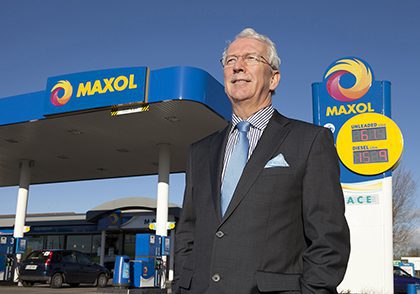Interview
A rise and a fall at Maxol

In the news lately for all the right reasons, the Maxol Group has bucked the recession trend and experienced a €60 million turnaround in its net cash position, from minus €41 million at the end of 2005 to a net cash position of +€18 million at the end of 2011.
A rise in retail
In January, Maxol unveiled a new forecourt identity and a five-year business development plan involving a €50 million investment to expand and upgrade its retail business. According to chief executive Tom Noonan, this should have a very positive impact on the overall image. “Good looking service stations are the best form of advertising we have, they help to reinforce a brand in which the consumer can have faith.”
Whilst the company has interests in three other distinct areas – fuel cards, distribution and lubricants, Mr Noonan explained that retail had proved to be the most lucrative area in recent times.
A fall in distribution
At present, distribution arm, Maxol Direct forms a modest portion of the business, down from over 40 businesses at its peak to less than 20 now. At one point the group, which had an annual turnover of €700 million in 2011, worked off the model of having one distributor per county across the island – a model that would be nowhere near feasible today with high costs and reduced working capital.
Following a shake-up of the business in the mid 2000s, the company decided to undergo “enormous rationalisation” and divested itself of many distribution businesses around Ireland, some of which had only been acquired a few years previously.
At the time, Maxol had begun to notice a slowdown in the fuel market and recognised that property prices had peaked. Home heat was considered too risky with an economic slow down imminent and encroaching competition from gas and solid fuel. With a shorter winter season, that spanned just three to four months, there was concern that its large team of drivers and vehicles would be left idle for the greatest part of the year. And so the decisive downsizing action, which has proved invaluable, was taken.
For those businesses that have survived in this difficult sector until now, Tom believes they are in a strong position to move forward. In order to do this, he says that people need to make sure their business is as efficient as possible and realise that cash is not everything. However, managing cash flow and having a balanced portfolio is of utmost importance with a greater need than ever to keep the fleet moving.
“In the downtime of the year, oil distributors need to look to the commercial market,” he says for businesses such as hauliers, pubs and other industries that carry on steadily enough throughout the year.
“The bottom line is that the industry has changed – domestic customers are using remarkably less oil and businesses in general are watching their pockets. The key to survival therefore is making big decisions fast in a bid to stay afloat.”